No Results Found
The page you requested could not be found. Try refining your search, or use the navigation above to locate the post.
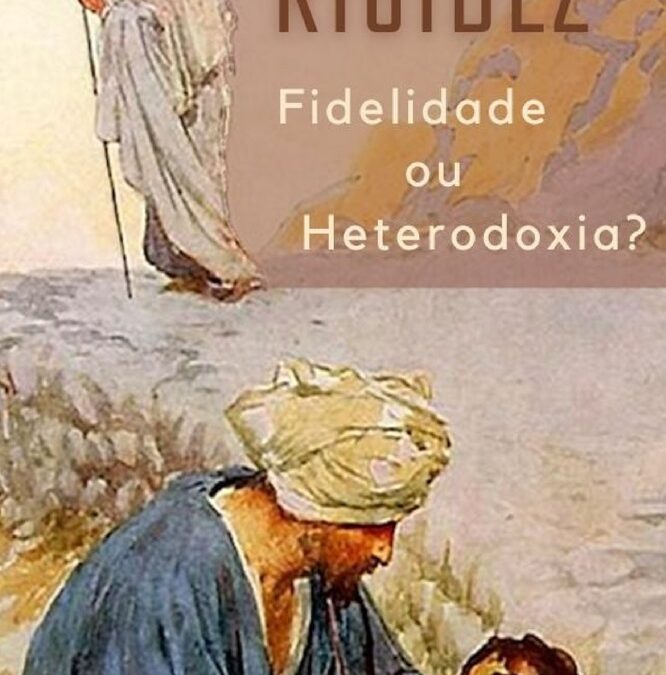
“Porque é que o Papa Francisco está sempre a criticar os católicos fiéis?” é uma pergunta frequentemente repetida sempre que o Santo Padre faz uma das suas habituais invectivas contra a rigidez religiosa. De facto, Francisco fez dessas denúncias uma marca do seu pontificado. Mas o que é que ele quer dizer com “rigidez”? Estará a atacar verdadeiramente os católicos fiéis? Estará a promover o laxismo moral e religioso?
Neste livro, Pedro Gabriel pretende clarificar os ensinamentos do Papa Francisco sobre a rigidez, relacionando-os com certas palavras-chave que surgem repetidamente nas suas intervenções. Procura também falsificar a ideia de que um católico é fiel por ser rígido, explorando exaustivamente precedentes na história da Igreja em que a rigidez nem sempre impediu os fiéis de caírem na heterodoxia. Finalmente, Gabriel explica como evitar a rigidez não implica necessariamente o extremo oposto do laxismo.
Brochura: $24.95 | Kindle: $9.99
Pedro Gabriel oferece-nos um livro maravilhoso sobre uma “Igreja em saída”, um apelo à educação de uma personalidade cristã flexível, mas com uma espinha dorsal forte. Descobre na fé não um obstáculo à plenitude da vida humana, mas um caminho – não só para a vida eterna, mas também para uma vida cem vezes mais humana aqui na terra.” – Do “Prefácio”, de Rocco Buttiglione, Membro da Pontifícia Academia das Ciências Sociais e da Pontifícia Academia de São Tomás
“Pedro Gabriel escreveu um livro verdadeiramente brilhante, não só pelo seu estilo legível, mas sobretudo pelo seu conteúdo pertinente. Rigidez: Rigidez:Fidelidade ou Heterodoxia? não é um mero exercício de apologética católica, mas um verdadeiro caminho educativo para aqueles de nós que precisam de redescobrir as razões para viver plenamente ‘a liberdade gloriosa dos filhos de Deus’ (Rm 8,21). O novo livro de Pedro Gabriel ajuda-nos, sem dúvida, a desintoxicar a vida cristã das frequentes tentações laxistas e rigoristas, tão populares e tão enganadoras no mundo atual. Nada mais oportuno para viver a fé com maturidade e equilíbrio seguindo os ensinamentos do Evangelho em comunhão com o Sucessor de Pedro.” – Rodrigo Guerra, Secretário da Pontifícia Comissão para a América Latina e Professor da Pontifícia Universidade Lateranense
“O Dr. Pedro Gabriel, aclamado pelos seus premiados livros A Ortodoxia de Amoris Laetitia e Heresia Disfarçada de Tradição, é um dos maiores especialistas no estilo e no ensino do Papa Francisco. Na sua última obra, Rigidez: Fidelidadeou Heterodoxia, ele baseia-se na sua pesquisa anterior, expandindo o que o Papa vê como um equívoco fundamental e irónico do significado da Tradição entre os autoproclamados tradicionalistas. Fá-lo através de uma análise das atitudes que daí decorrem, melhor entendidas como rigidez e indietrismo (atraso). O Dr. Gabriel, na sua forma cativante, desafia os leitores a reavaliarem se compreenderam verdadeiramente o significado da exortação de S. Paulo para “permanecerem firmes e manterem as tradições que vos foram ensinadas” (2 Tess. 2:15 RSVCE), e exorta-os a reflectirem de forma justa sobre as preocupações do Papa Francisco sem recorrerem à defensiva ou a reacções irreflectidas. Baseando-se na auto-compreensão da Igreja sobre a fidelidade à Tradição, talvez melhor expressa no parágrafo 100 do Catecismo da Igreja Católica e no parágrafo 8 da Dei Verbum , o Dr. Gabriel oferece uma abordagem mais segura, abrangente e prática para navegar nas aparentes tensões entre o Magistério e a Revelação Divina do que, sem dúvida, a maioria dos tradicionalistas está familiarizada. Através de um exame meticuloso das heresias históricas, da tradição da ética da virtude de Aristóteles e Aquino, e dos ensinamentos dos papas, tanto pré como pós-conciliares, o Dr. Gabriel navega habilmente pelas complexidades da rigidez, do rigorismo e da escrupulosidade que daí resulta, para conduzir os leitores a uma maior liberdade em Cristo, pois “o Senhor é o Espírito, e onde está o Espírito do Senhor, aí há liberdade”. (2 Cor. 3:17).” — Andrew Likoudis, Editor, The Divine Primacy of the Bishop of Rome and Modern Eastern Orthodoxy, Membro Associado, Fellowship of Catholic Scholars
“Muitos católicos conservadores e tradicionais ficam ofendidos com as advertências do Papa Francisco sobre a rigidez. Acreditam que ele está a associar a fidelidade à rigidez. Pedro Gabriel mostra que isso é um completo mal-entendido das preocupações do Santo Padre. O Papa Francisco está, na verdade, a defender a autêntica tradição católica, que procura o meio-termo entre laxismo e rigidez. Nesta obra tão necessária, Gabriel faz um levantamento histórico dos vários grupos da história católica que criticaram a Igreja imoral e laxista, ao mesmo tempo que se afirmavam verdadeiros, puros e autênticos seguidores do Evangelho. Ao longo da sua história, a Igreja Católica resistiu a vários grupos rigoristas, como os judaizantes, os novacianistas, os donatistas, os espiritualistas e os jansenistas. Gabriel não afirma que os católicos rígidos de hoje possam ser identificados exatamente com qualquer um destes movimentos heréticos. No entanto, nota certas semelhanças, especialmente na tendência comum de acreditar que a Igreja institucional é corrupta ou mal orientada e que o seu próprio movimento representa a verdadeira fé. Gabriel não só explora a história dos movimentos rigoristas, como também fornece uma compreensão autêntica do que o Papa Francisco quer dizer com as formas actuais de pelagianismo e gnosticismo. Na minha opinião, Pedro Gabriel compreende o Papa Francisco muito melhor do que os críticos papais. Ele mostra que o Santo Padre é um filho fiel da Igreja, mergulhado na tradição católica de Agostinho, Aquino e Liguori – uma tradição marcada pelo equilíbrio, misericórdia e discernimento.” – Robert Fastiggi, Ph.D. Professor de Teologia Dogmática, Seminário Maior do Sagrado Coração, Detroit, Michigan
The page you requested could not be found. Try refining your search, or use the navigation above to locate the post.
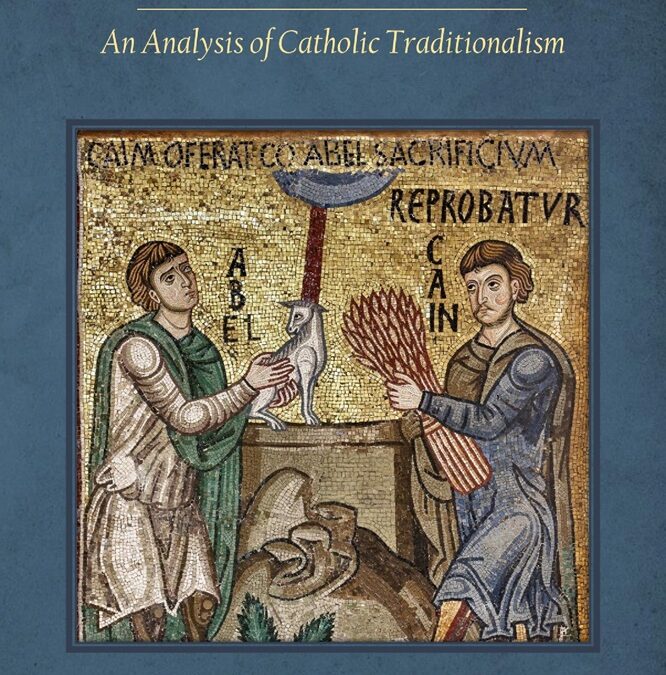
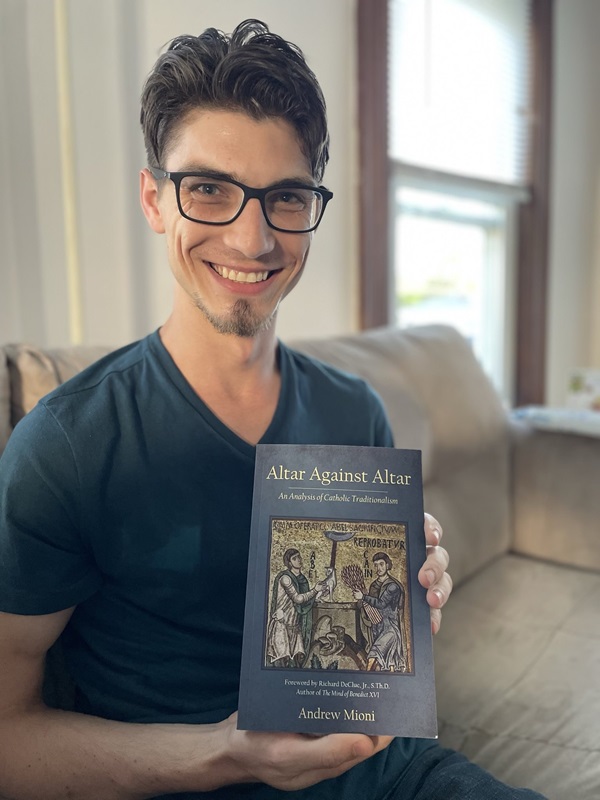
Hardback: $29.95 | Paperback: $19.95 | Kindle: $9.99
Likoudis, Andrew. (July 3, 2024). “Altar Against Altar: Wrestling with rifts in the Catholic Church.” On wherepeteris.com. To read, click here.
“Catholic traditionalism is not Catholicism but an ideological cult, the reactionary mirror-image of Catholic progressivism, also anti-Catholic. If you tend to agree with this but would like rigorous and principled arguments that prove its truth, Mioni’s book is for you.” – Thaddeus Kozinski, author of Words, Concepts, Reality: Aristotelian Logic for Teenagers
“Andrew Mioni’s book Altar Against Altar is a breath of fresh air amidst a sea of confusion. It exhibits a Chestertonian ‘radical orthodoxy’ or ‘radical center’ point of view, which is essentially the same as the “mind of the Church.” Mioni dispassionately, eloquently, and charitably refutes the underlying false and dangerous presuppositions entailed in the excessive and extreme factions of the traditionalist movement. Not all traditionalism is bad, by a long shot (we must always note). The crucial and necessary distinctions are made in this volume. Particularly helpful are Mioni’s insights regarding Vatican II and the Pauline (‘New’) Mass. He shows that they are not — like money — the roots of all kinds of evil, and that historical causation is far more complex than the logical fallacy of post hoc ergo propter hoc (‘after this, therefore because of this’). It would seem to be a simple enough thing to understand, yet hundreds of thousands have been led astray in this regard. Mioni backs up his analysis with copious documentation from Church documents, as well as writings from the SSPX and others of like mind. He makes a solid case that will stand up to scrutiny. Altar Against Altar is an exceptional, Spirit-led treasure trove of edifying and educational orthodox Catholic wisdom. I believe that it will lead many out of these serious and soul-harming errors. I’m happy to give it my highest and most enthusiastic recommendation.” – Dave Armstrong, Catholic apologist and author
“Mioni’s book fills a critical void in Catholic theology today, by providing a scholarly and balanced repudiation of a movement that is dividing the Catholic Church and stealing souls from the one fold of Christ: namely, a pseudo-Catholic theology that masquerades as fidelity to tradition while actually substituting private judgment, division, and insularity for authentic Catholicity. This important work will prove to be a valuable resource for both pastors and laity alike, as they grapple with the challenges wrought by traditionalism within their parishes, families, and the broader Church.” – Fr. Eric Gilbaugh, Priest of the Diocese of Helena
“Intelligent, insightful, and refreshingly charitable, Altar Against Altar is the book I needed but which sadly did not exist when I became a pastor in 2020. Frequently, many of the beloved sheep in my flock would express confusion about the numerous “Catholic denominations” that seem to abound. Which variety of Catholic should I be? This was a common point of anxiety and confusion. Andrew Mioni asks all the right questions in a way that cuts through the fog, avoids the red herrings, and brings new hope for anyone who wants to be a faithful and joyful Catholic in our fallen world. His book resoundingly answers several critical questions: When ‘traditional Catholics’ tell me that I must boycott the Novus Ordo Mass to be a good and faithful Catholic, is it true? What does authentic communion with our Holy Father and my local bishop look like? What is at the heart of the Church’s authority and what does it mean to live obediently under that authority? If you desire to fearlessly live out Christ’s call to be “salt and light” without rejecting the beauty of the Second Vatican Council and without breaking off communion with the Church, this book is for you. I will most certainly be recommending this book to all my brother priests as well as to anyone that wants to understand how to approach ‘Catholic Traditionalism’ in a healthy and informed way.” – Fr Justin Hamilton, Priest of the Archdiocese of Kansas City, Kansas
“Andrew Mioni has provided the faithful with an impressive response to dissenters who undermine Christ’s church under the guise of tradition. He tackles a wide range of topics, from disputes over authority to liturgical controversies, with a masterful command of the magisterium. I highly recommend all who wish to acquire the mind of the church on controversies raging in the church today to read Altar Against Altar.” – Michael Lofton, Host & Founder, Reason & Theology; Professor, Catholic Polytechnic University
“Andrew Mioni addresses the principles of Traditionalism with erudition and eloquence, and without becoming mired in the talking points of the traditionalists which obscure the fundamental issues. The phenomenon of Traditionalism has assumed an influence within wider Catholicism that I could not have foreseen as a priest of the Society of St Pius X 30 years ago. Altar Against Altar: An Analysis of Catholic Traditionalism is a timely and welcome answer to the pernicious movement against the Second Vatican Council. I wish it a wide audience, and trust it will assist those who struggle to accept the Council and the pontificate of Francis.” — Gary Campbell, former SSPX priest
“Mioni’s work is an indispensable guide for anyone seeking to understand the complexities of the crisis in the Catholic Church, especially as it pertains to the rise of traditionalism and the challenges posed by the Society of Saint Pius X (SSPX). The author navigates through the tumultuous waters of the Church’s recent history with a keen analytical eye—as well as a remarkable breadth and depth of vision—addressing the contentious issues that arose after the Second Vatican Council. Issues caused by misinterpretation, uneven implementation, and subsequent resistance to the Council in some quarters. This is due to a faulty and ahistorical theological paradigm. Mioni’s analysis of these issues is both thorough and empathetic, acknowledging the pain and confusion experienced by many in the Church, while also critiquing the self-enclosed circle mentality that often characterizes traditionalist enclaves—and he does this from a place of experience within these circles himself. In an ecclesial atmosphere where many conservatives hesitate to critique traditionalism due to a “no enemies to the right” policy, Andrew Mioni’s book Altar Against Altar emerges as a bold and constructive contribution. It is essential reading for scholars, clergy, and laypeople who are wrestling with these issues, and offers a way forward that respects the Church’s heritage while also welcoming its future.” — Andrew Likoudis, Editor, Faith in Crisis: Critical Dialogues in Catholic Traditionalism, Church Authority, and Reform; Associate Member, The Society for Catholic Liturgy
“Altar Against Altar is an important new book on the topic of ‘Catholic traditionalism.’ It is new in the sense that it is recent, but it is also new in the sense that it offers a perspective not yet considered, although sorely needed. This perspective entails the bracketing of all canonical specificities (debated ad nauseam and often to no avail), followed by the turning to a historical perspective, common sense, and basic principles of the Catholic faith. Instead of arguing whether this or that conciliar, liturgical, or magisterial text is the root of our woes, it asks us to consider the progressively dire trends of modernity alongside the progressively alarmed warnings of 19th and 20th century popes and theologians. Instead of arguing whether the Church canonically provides supplied jurisdiction to vagus clergy and/or priestly communities, it asks what it would mean if the Church did. Instead of arguing that there cannot be a state of necessity in the Church, it asks what it would mean if there was. Altar Against Altar is an important book because it brings—for the first time—a dose of common sense and a palpably Catholic spirit to an overly fraught question. It is a must-read in the midst of the polemics fueled by Denzinger-thumping armchair theologians taking place in Catholic circles on the internet.” — Dom Dalmasso, Host, The Logos Project; Editor-in-Chief, The Ecclesia Blog; M.A. Student in Dogmatic Theology, Holy Apostles College and Seminary.
“With truth and wisdom and charity, Andrew Mioni ventures into the heart of one of the great problems facing the Church today. His personal experience and detailed analysis of the various points of the traditionalist movement are simply and clearly synthesized in Altar Against Altar. This book is a powerful apologetic tool for those who are in traditionalist spheres, have exited from them and are trying to reorient themselves, or who have friends and relatives still under their sway; at the same time, Altar Against Altar provides a beautiful defense of the Catholic Church and of our need to maintain our trust in Her and remain fully united to Her and Her lawful shepherds. Andrew’s work is also a humble and implicit reminder to all of us of how it is the Church’s mission to save us; it’s not our mission to save the Church. God promises that His Church will not fail (cfr. Mt 16:18) and He will not go back on His promise.” — Fr. Terrance J.M. Chartier, S.T.B., FI (Franciscans of the Immaculate), host at Mother of the Redeemer Retreat Center, Bloomington, IN
“Andrew Mioni’s Altar Against Altar is a clear, concise, and confident response to the Traditionalist challenge to the Church. A devastating critique, it reveals that the sources of this ideological movement’s internal rot are, in a strange plot twist, the same sources underlying the errors of liberalism and modernism! Andrew and I both grew up in the movement (although we never met), and from our separate personal studies of the Tradition we both came to understand a stunningly ironic fact: Traditionalism is not Traditional! His copious quotes from the Magisterium of the Church demonstrating this reality are unanswerable and irrefutable. I believe Altar Against Altar is a landmark contribution to this debate, and its value stems not only from the errors it refutes, but even more from the beauty of the Church’s life and truth it reveals by clearing them away.” — Mr. Andrew Bartel, OP; Author, “Why I Left the Society of St. Pius X: An Open Letter to Fr. Gołaski”
“An honest and compelling examination of Traditionalist claims, Altar Against Altar actually is what other books only claim to be: scholarly, easily-digestible, thought-provoking and 100% Catholic. Andrew knows his subject matter from the inside out. He charitably challenges the multiplicity of excuses that dissenting traditionalists use, and simultaneously reminds us of the beauty and wisdom inherent in the Church’s structure as Christ established it. This book will long be an excellent aid for those seeking clarity for their own sake, as well as for productive dialogue with radical traditionalism. I can’t recommend it too highly!” — Laura Vander Vos, Host, Misshappycatholic; creator and co-founder, TradRecovery.com
“Radical Traditionalists are rebelling against Holy Mother Church while confusing many in the process. This book does a superb job of pulling apart their claims and objections, one by one, and answering them. It is timely, well-researched, logically presented, and backed up by a plethora of sources and citations. It is an important resource that offers powerful counter arguments against Traditionalists and is very much needed in the Church today.” – Bryan Mercier, Catholic apologist, speaker, author, and President of Catholic Truth
“Altar against Altar provides an insightful investigation into the internal contradictions of the Traditionalist worldview written in a spirit of pastoral charity with an intention to heal the rift that separates our Catholic brethren.” – Dr. Sebastian Mahfood, OP, co-author with Ronda Chervin of Catholic Realism

The page you requested could not be found. Try refining your search, or use the navigation above to locate the post.
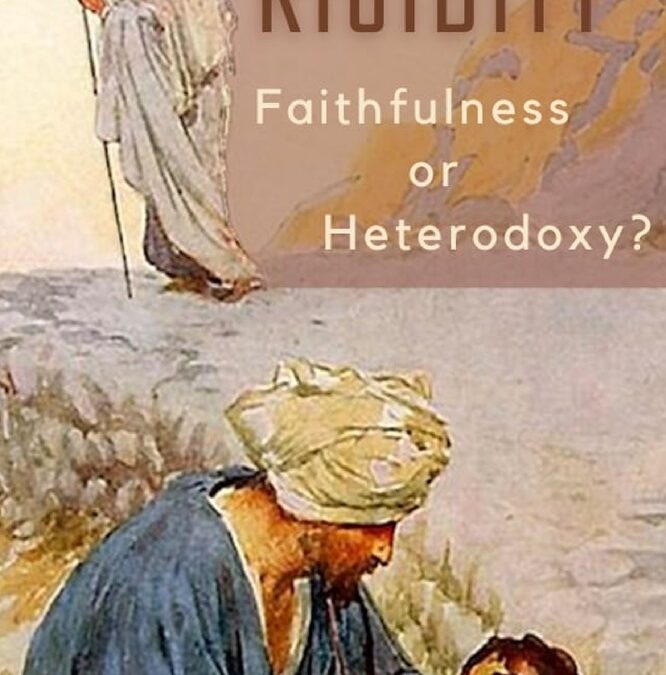
“Why is Pope Francis always criticizing faithful Catholics?” is an oft-repeated question whenever the Holy Father makes one of his usual invectives against religious rigidity. Francis has indeed made such denunciations a hallmark of his pontificate. But what does he mean by “rigidity”? Is he truly attacking faithful Catholics? Is he promoting moral and religious laxity?
In this book, Pedro Gabriel aims at clarifying Pope Francis’ teachings on rigidity, by relating them with certain keywords emerging repeatedly in his interventions. He also seeks to falsify the idea that a Catholic is faithful by being rigid, by comprehensively exploring precedents in Church history where the rigid course of action did not always prevent the faithful from falling into heterodoxy. Finally, Gabriel explains how eschewing rigidity does not necessarily entail the opposite extreme of laxism.
Paperback: $24.95 | Kindle: $9.99
“Pedro Gabriel gives us a wonderful book on an ‘outgoing Church,’ a plea for the education of a Christian personality that is flexible but with a strong backbone. He discovers in the faith not an obstacle to the fullness of human life but a path—not only to eternal life but also to a life one hundred times more human here on earth.” – From the “Foreword,” by Rocco Buttiglione, Member of the Pontifical Academy of Social Sciences and of the Pontifical Academy of St. Thomas
“Pedro Gabriel has written a truly brilliant book, not only for its readable style but above all for its pertinent content. Rigidity: Faithfulness or Heterodoxy? is not a mere exercise in Catholic apologetics, but a true educational path for those of us who need to rediscover the reasons for living to the full ‘the glorious freedom of the Children of God’ (Rom 8:21). Pedro Gabriel’s new book undoubtedly helps us to detoxify the Christian life from the frequent laxist and rigorist temptations that are so popular and so misleading in today’s world. Nothing could be more opportune to live the faith with maturity and balance following the teachings of the Gospel in communion with the Successor of Peter.” – Rodrigo Guerra, Secretary of the Pontifical Commission for Latin America and Professor at the Pontifical Lateran University.
“Dr. Pedro Gabriel, acclaimed for his award-winning books The Orthodoxy of Amoris Laetitia and Heresy Disguised as Tradition, is a foremost expert on the style and teaching of Pope Francis. In his latest work, Rigidity: Faithfulness or Heterodoxy, he builds on his previous research by expanding upon what the Pope views as a fundamental and ironic misconception of the meaning of Tradition among self-proclaimed traditionalists. He does this by providing an analysis of the attitudes that flow from it, best understood as rigidity and indietrism (backwardness). Dr. Gabriel, in his winsome way, challenges readers to reassess whether they have truly grasped the meaning of St. Paul’s exhortation to ‘stand firm and hold to the traditions which you were taught’ (2 Thess. 2:15 RSVCE), and he urges them to fairly reflect on Pope Francis’ concerns without resorting to defensiveness or kneejerk reactions. Drawing on the Church’s self-understanding of fidelity to Tradition, perhaps best expressed in Catechism of the Catholic Church paragraph 100 and Dei Verbum paragraph 8, Dr. Gabriel offers a more secure, comprehensive, and practical approach to navigating the apparent tensions between the Magisterium and Divine Revelation than undoubtedly most traditionalists are familiar with. Through a meticulous examination of historical heresies, the virtue ethics tradition of Aristotle and Aquinas, and the teachings of popes, both pre- and post-conciliar, Dr. Gabriel skillfully navigates the complexities of rigidity, rigorism, and the scrupulosity that results, to lead readers to a greater freedom in Christ, for ‘the Lord is the Spirit, and where the Spirit of the Lord is, there is freedom.’ (2 Cor. 3:17).” — Andrew Likoudis, Editor, The Divine Primacy of the Bishop of Rome and Modern Eastern Orthodoxy, Associate Member, Fellowship of Catholic Scholars
“Many conservative and traditional Catholics take offense at Pope Francis’s warnings about rigidity. They believe he is associating faithfulness with rigidity. Pedro Gabriel shows that this is a complete misunderstanding of the Holy Father’s concerns. Pope Francis is actually upholding the authentic Catholic tradition, which seeks the golden mean between laxism and rigidity. In this much-needed work, Gabriel provides an historical survey of various groups in Catholic history that have criticized the immoral and lax Church while claiming to be the true, pure, and authentic followers of the Gospel. Throughout her history, the Catholic Church has resisted various rigorist groups such as the Judaizers, the Novatianists, the Donatists, the Spiritualists, and the Jansenists. Gabriel does not claim that the rigid Catholics of today can be identified precisely with any of these heretical movements. He does, however, note certain similarities, especially in the common tendency to believe that the institutional Church is corrupt or misguided and one’s own movement represents the true faith. Gabriel not only explores the history of rigorist movements; he also provides an authentic understanding of what Pope Francis means by present forms of Pelagianism and Gnosticism. In my opinion, Pedro Gabriel understands Pope Francis far better than the papal critics. He shows the Holy Father to be a faithful son of the Church, steeped in the Catholic tradition of Augustine, Aquinas, and Liguori—a tradition marked by balance, mercy, and discernment.” – Robert Fastiggi, Ph.D. Professor of Dogmatic Theology, Sacred Heart Major Seminary, Detroit, Michigan
The page you requested could not be found. Try refining your search, or use the navigation above to locate the post.
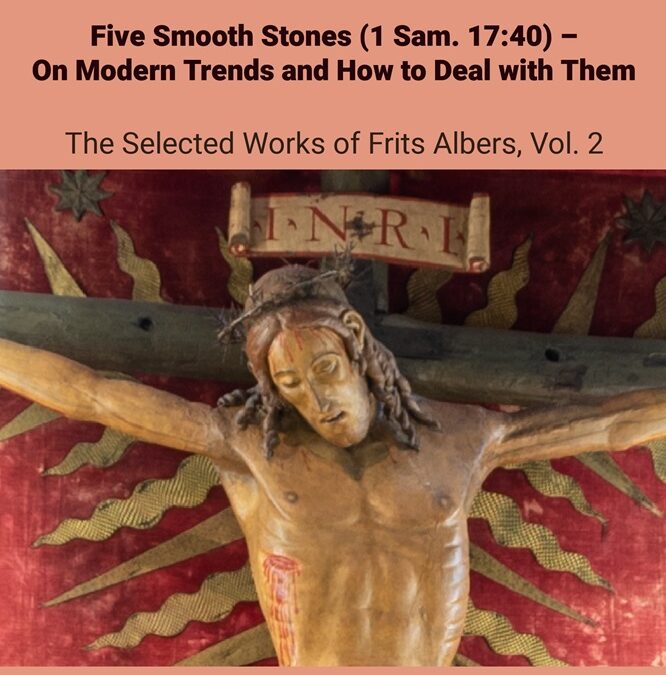
Selected for publication in this second volume of the works of Frits Albers are the following three written in the 1970s.
A principal reason for publishing anew these books written almost fifty years ago can be gathered from the author’s own words taken from his Vatican II.
“It is from our era, and from the Church of our era, still so close to us, that we must wrestle to partly unlock the mystique contained in the very essence of Vatican II. For our own immediate benefit as well as for the benefit of the Catholics to whom Catholic Tradition must be handed over in its entirety. No doubt Vatican II has a clear message for the Church of the future, but this great Council happened in our time, and future generations of Catholics depend on us – on how well we understood that time. How well our Catholic children will comprehend the past which happens to be our present, depends entirely on us.”
Many of the Catholic children of that era (and now their children also) hold positions of responsibility in society and in the Church. The younger generations of Catholics who were born after Vatican II and the promulgation of the Novus Ordo, if they take to heart the author’s words quoted above, should derive no little profit from the works presented in this volume. May the three works included in this present volume bring instruction, guidance and hope to Catholics in their quest to advance in knowledge and love of holy Mother Church and its life giving Teaching and to dispel the dark clouds of confusion, error and subterfuge they have to deal with in modern day ‘catholic’ environments, and finally to give them sound practical guidance on how to overcome and defeat the real enemy.
Paperback: $19.95 | Kindle: $9.99
This is the second volume of the collected works of Frits Albers. The first volume has been published only recently. The works concerned first appeared as articles dating from as early as the 1970s but with later editions appearing as late as AD 2000.
I have provided a testimonial to the first volume and what I said in it applies to the present works. There are three books that are included in this second volume. Put shortly, the first two are defences of Vatican II and the Novus Order of the Mass, and the third is a guide to how to deal with the threats to the Faith by the controversies surrounding what the changes are, let alone how they are to be interpreted.
As may be expected, Frits Albers has embarked upon quite a task, for as he himself notes in quoting St. Paul, such are the profundity and eternal consequences of the issues involved, we are up against “Principalities and Powers”. However, as I see his effort as a man of strong faith, he is well up to the task. One indication of the pointed truth of what he says may be gathered from the fact that his books have been neglected to be widely published for nigh on 50 years since they appeared at the very time when the theological errors and their related sinful practices were begun to be promoted with an enthusiasm that would be gratifying to their evil originators.
Indeed, such has been the forcefulness of this promotion, reaching even to the highest levels of the religious and hierarchical life of the Church, that their malign influence is today deeper and wider than ever.
The publication of Albers’ works could not be more urgent. His assessment and refutation of the modernist error (presented most insidiously in Teilhard de Chardin’s writings) that underlies the whole push to change the doctrinal basis of Catholic life and practice is so thorough and telling, that it is hard to see how any person of honest disposition, prepared to give him a fair hearing, would not be won over by his clear exposition of the positions of the parties to the controversy and even clearer determination of the issues. There is much in this volume to be digested and we have space to make only one point, hopefully to give the reader some idea of the value of his work.
With regard particularly to the first two books included we need to note a problem of language which is to do with the inability of the modern mind to make distinctions, so that even in ecclesiastical Latin phrases there is a hidden prejudice to taking the word in a sense that favours the modernist position. As is clear from what we observe about his work, Frits Albers is one who has been able to make the distinctions needed to avoid the modernist mind-set that sadly even afflicts “not a few” modern Catholic theologians. (cf. Fides et ratio n. 61)
The problem of language use, or rather misuse, can apply even to words used by popes, such as Pope John XXIII’s use of the Italian aggornimento. Words such as “renew” and “reform” are used constantly in the modern era to close down opposition to the hidden intent or real meaning of “deform” or “destroy”. Even the word “deconstruction” is used openly to imply some sort of constructive change instead of simple destruction.
So too the Latin Novus Ordo is subtly taken to mean the rejection of the old rite. Then, the Magisterium has to go to great lengths to explain the distinction between what in the liturgy is capable of change and what is not. So, as regards the latter, there is no new rite replacing the old. The Novus Ordo has to be the same in essence, or in substance, as the old, or it is not Catholic. Of course, those who are opposed to the “new rite” are keen to find differences of substance.
The Novus Ordo is the same in essence as the one it has replaced and the Mass is the same as it was from the beginning. This problem of preference for taking any change as an essential (or substantial) change is applied throughout. It is applied to the fabricated distinction between Vatican II and “Pre-Vatican II”. Confusion reigns all round, including among “well educated” Catholics at University level.
The Magisterium is occupied constantly in explaining that there is no discontinuity between the teachings of Vatican II and previous doctrinal positions in the long history of Catholic Tradition. One wonders however, with the barrage of loud voices to the contrary, how much effect these magisterial “interventions” have.
A poor education in the use of language and logic (which are intimately connected) hampers the one side of the argument and favours the other (no prizes for guessing which is which).
Without making any criticism of Frits Albers himself, for his intent is clear where he does so, he uses the word “community” in a way that could be problematic. There is nothing wrong with the ordinary meaning of the word itself. Indeed, transferred to the order of grace and the divine it can be used of the Trinity. But, precisely because of its soundness and sacred application, it is used or rather misused in the most profound way in modern political and religious life.
As to the former, it is as if we confused it with Communism, whereby the very notion of civil community is destroyed and citizens brutalized. This misuse has become insinuated even into Catholic thinking (and practice) in most recent times. (The word “synod” can be misused in the same way)
A more appropriate word in the place concerned would in my view be “collective”, for Albers is referring to a grouping where there is no true unity but a kind of herd-like gathering that tries to bully individual Catholics who are deprived of the leadership they deserve. (This is not a condition peculiar to Catholic congregations but is a general condition of modern political life)
It is quite remarkable that Albers picked up this abusive application of the word so early. The malign connotation exploited by them, some clergy were referring to the “parish community” when a good portion of the congregation were losing their faith in central doctrines, especially with regard to sexual morality, and so did not really have unity with those that had kept them. It became almost impossible to use the word in its right sense.
We put this comment then only to show how difficult it is in modernist (which equates with “fashionable” – those people Chesterton called “Thursdayites”) controlled conversations to have any intelligent/ intelligible dialogue at all.
In connection with this we might note that the very word “Thomist” was coming to be given a fabricated connotation that suited the modernist climate of thought, and used as opposed in some way to a less “rigid” Catholic Franciscan sentiment. This is very subtle in that it is designed to undermine the unity of mind and spirit that existed (and still exists in Heaven) in relation to the two great saints, when it might apply to some of their not so holy or learned followers. Read the two wonderful books of Chesterton on the saints to get the balanced view of their holy relationship.
Despite the linguistic difficulty, which all the faithful have to contend with, this collection of books of Frits Albers is powerful in all respects and one can only pray that it reaches the audience that needs it, which is all of us today.
— Dr. Donald G. Boland, author of Rev. Fr. Austin M. Woodbury, SM, PhD, STD and the Aquinas Academy (1945 – 1975); also see his Compendium
Frits Albers Ph. B (1921-2000) was born in Holland and studied under the Jesuits at Nijmegen during the 1940s. He emigrated to Australia in 1951, and travelled extensively within the south-east region of the ‘lucky country’. He joined the Department of Education in Victoria and worked as a high school teacher who specialised in mathematics, French and English.
In the early post Vatican II period he realised that the strange interpretations of the recently concluded Council that were being forced upon Catholics were under pinned by the same philosophy he had been taught in the 1940’s by the Jesuits at Nijmegen in the name of St Thomas Aquinas, but which in reality was the systematic Modernism of Pierre Teilhard De Chardin, S.J. Thus, in the early 1970’s he began writing articles and books to expose the philosophical root of these errors and aberrations of Teilhard De Chardin, and to defend Catholic Faith, clear thinking, and right philosophy.
The editor is a retired electrical engineer who worked for most of his professional career in the specialist area of power generation. In a sabbatical year, he completed post graduate research in the History and Philosophy of Science at the University of Melbourne. He has long loved the philosophy of St Thomas Aquinas.
The page you requested could not be found. Try refining your search, or use the navigation above to locate the post.
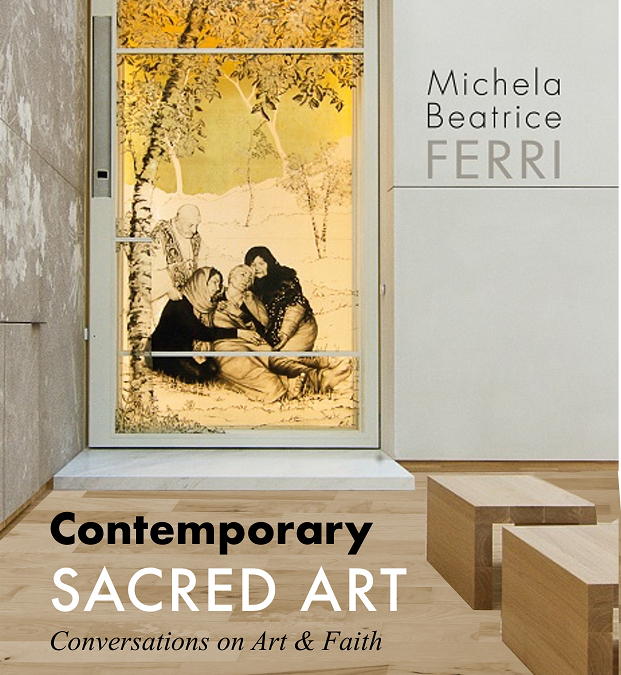

In translation now from the Italian. Buy it in the original language here:
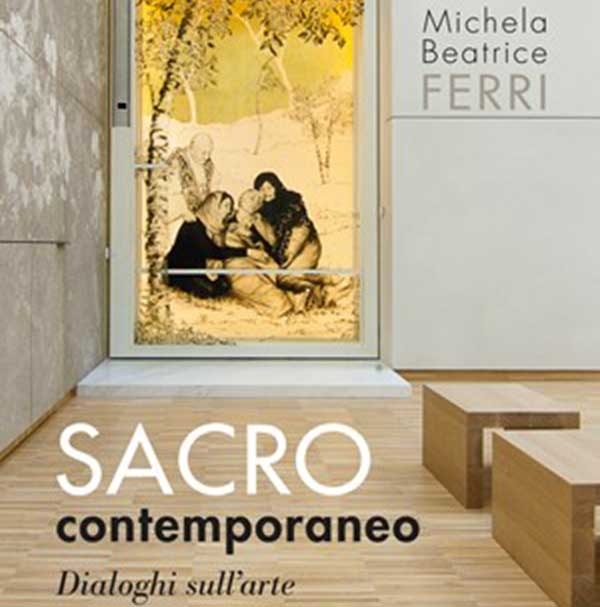
What is the so-called “Contemporary Sacred Art”? In her book, Michela Beatrice Ferri inquires about the themes of what we can call “Sacred Art” and “Religious Art” nowadays in our churches, in our Sacred Spaces, in the pictures we see, and in the sculptures we admire. The author collected eighteen dialogues, a third with the most important Italian Scholars in the field of the Sacred Art, and the remainder with the most important Italian artists working with the Catholic Church and working on the theme of the Religious, of the Sacred.
In this book, the author leads the discussion with the theoretical basis of the field that we can call “the aesthetics of Sacred Art,” bringing together the messages of Pope Paul VI and Pope John Paul II to the artists with the Thomistic Perspective and the phenomenological point of view to create a starting point for a pioneer study on Contemporary Art in our Churches, in our Sacred Places, and in every visual representation we have with us.
WCAT Radio “Two Wings Seminar” Presentation
Listen to “Dr. Michela Beatrice Ferri – What is the meaning of the expression ‘Contemporary Sacred Art’ ?” on Spreaker.
Telepace Trento
http://www.telepacetrento.it/archivio-video/spart/861
TBA
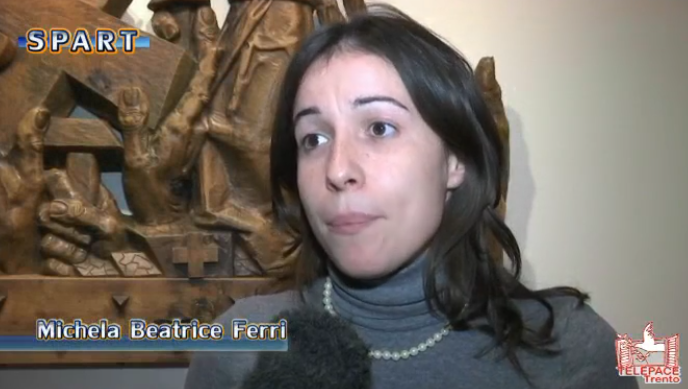 Michela Beatrice Ferri, Ph.D. in Philosophy, born in Italy, is a Roman Catholic professor and writer and teaches for Holy Apostles College & Seminary in Cromwell, CT, USA.
Michela Beatrice Ferri, Ph.D. in Philosophy, born in Italy, is a Roman Catholic professor and writer and teaches for Holy Apostles College & Seminary in Cromwell, CT, USA.
Michela’s BA thesis in Philosophy, discussed in 2005 at the Università degli Studi di Milano, is dedicated to Edmund Burke and to the birth of the Modern Sublime (“Burke e la genesi moderna del sublime”). Her MA thesis in Philosophy, discussed in 2007 at the Università degli Studi di Milano, is dedicated to the concepts of “time” and of “art” in the first reception of Phenomenology in Italy (“Tempo e arte nella fenomenologia italiana”).
In February 2012, Michela received her Doctorate in philosophy (Ph.D.) at the Università degli Studi di Milano, with a dissertation dedicated to the reception of Phenomenology in the United States of America. Her Ph.D. dissertation is the first work ever appeared in Italy, in Europe, and in North America focused on the history and on the analysis of the reception of Husserlian Phenomenology in the North America. She is the Editor of the great volume: “The Reception of Phenomenology in North America” – https://rd.springer.com/book/10.1007%2F978-3-319-99185-6#toc – published in June 2019 by Springer Nature – Springer International Publishing.
Michela is recognized as one of the leading experts in the field of Sacred Art and is the author of a volume dedicated to the dialogue between Catholic Faith and Art, devoted to an inquiry about Contemporary Sacred Art entitled Sacro Contemporaneo. Dialoghi sull’arte, published in 2016 by the Roman Catholic publishing house Áncora Editrice based in Milan, Italy. In this book, she presents dialogues that she has had with the major Roman Catholic art historians and with the most important Contemporary Artists operating in Italy. This book is published in English by En Route Books and Media.
Michela is also journalist. She works for several Roman Catholic journals, writing about Philosophy, Theology, History, Aesthetics, Sacred Art, History of Art and History of Architecture, Church, and Jewish Studies.
Since 2009, Michela has been married to Luca Stucchi, Catholic, Engineer and MS in Computer Science.
The page you requested could not be found. Try refining your search, or use the navigation above to locate the post.
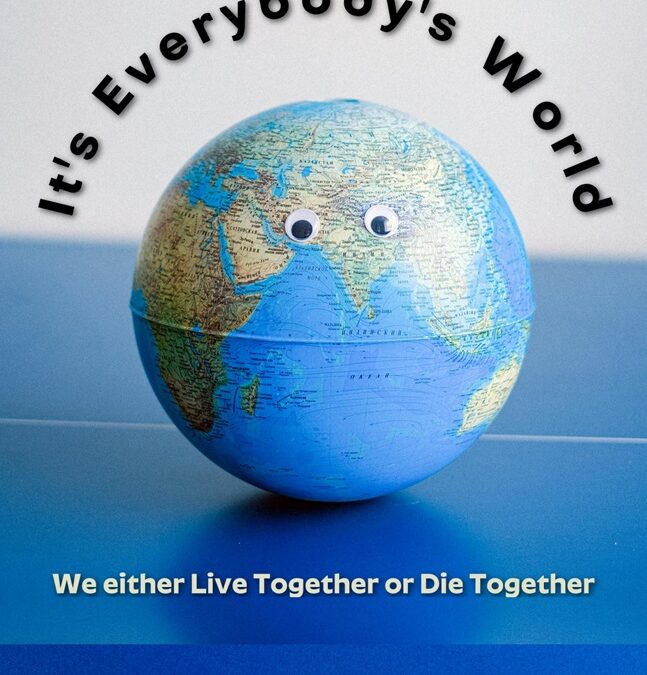
This book invites global communities to seek the peaceful advancement of humanity that globalisation can bring about and open the gates to a common future, casting away the other troubles that nationalist ideologies trigger.
Paperback $14.95 | Kindle $9.99
“Sixty years ago, in his magisterial Letter from Birmingham City Jail, the Rev. Dr. Martin Luther King Jr. wrote ‘We are caught in an inescapable network of mutuality, tied in a single garment of destiny. Whatever affects one directly affects all indirectly.’ In this marvelous new book, Robin Arthur shows us some of the many ways in which we are interconnected. We need to understand our connections and our mutual interdependence if we are to survive. The stories in this book give me hope and should be read by everyone who is interested in our shared future.” – Amir Hussain, Professor of Theological Studies, Loyola Marymount University
Robin Arthur is a newspaper editor and a journalist who won the Pan-Asia Journalism award in 1995. This book is a sequel to Global Healing, which he released in June 2019. He has written several other books including Can the Poor Inherit the Earth, which is an opinion on Third World development paradigms and which won acclaim from UN organizations including UNESCO and UNDP. His first novel, The Island of Habarra, provides a glimpse into the sad narrative of expatriate workers who leave families and home behind to work in the oil-rich Persian Gulf. In Canada, Arthur worked to develop an appreciation of interfaith dialogue, and between 2011 and 2016 convened three very successfully staged Spiritual Diversity Conferences, paving the way for the establishment of an Interfaith Council in the city of Halifax.
The page you requested could not be found. Try refining your search, or use the navigation above to locate the post.